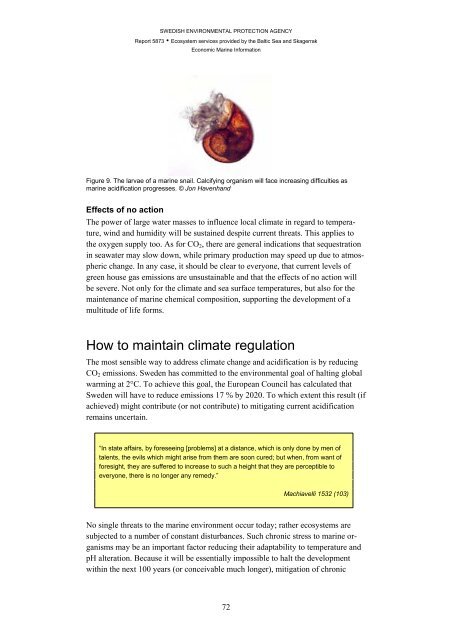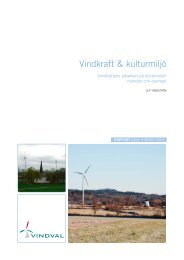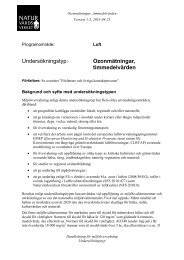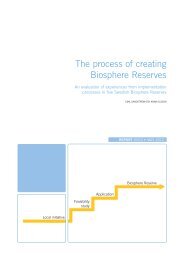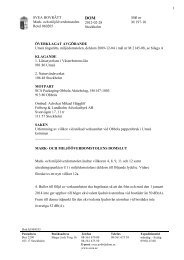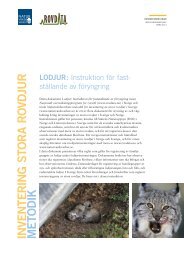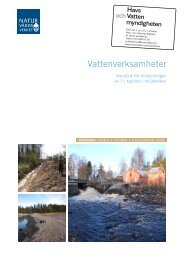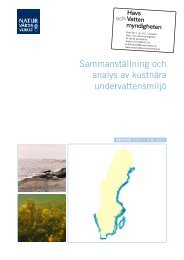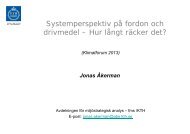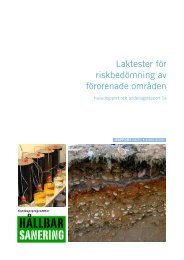Ecosystem services provided by the Baltic Sea ... - Naturvårdsverket
Ecosystem services provided by the Baltic Sea ... - Naturvårdsverket
Ecosystem services provided by the Baltic Sea ... - Naturvårdsverket
You also want an ePaper? Increase the reach of your titles
YUMPU automatically turns print PDFs into web optimized ePapers that Google loves.
SWEDISH ENVIRONMENTAL PROTECTION AGENCY<br />
Report 5873 • <strong>Ecosystem</strong> <strong>services</strong> <strong>provided</strong> <strong>by</strong> <strong>the</strong> <strong>Baltic</strong> <strong>Sea</strong> and Skagerrak<br />
Economic Marine Information<br />
Figure 9. The larvae of a marine snail. Calcifying organism will face increasing difficulties as<br />
marine acidification progresses. © Jon Havenhand<br />
Effects of no action<br />
The power of large water masses to influence local climate in regard to temperature,<br />
wind and humidity will be sustained despite current threats. This applies to<br />
<strong>the</strong> oxygen supply too. As for CO 2 , <strong>the</strong>re are general indications that sequestration<br />
in seawater may slow down, while primary production may speed up due to atmospheric<br />
change. In any case, it should be clear to everyone, that current levels of<br />
green house gas emissions are unsustainable and that <strong>the</strong> effects of no action will<br />
be severe. Not only for <strong>the</strong> climate and sea surface temperatures, but also for <strong>the</strong><br />
maintenance of marine chemical composition, supporting <strong>the</strong> development of a<br />
multitude of life forms.<br />
How to maintain climate regulation<br />
The most sensible way to address climate change and acidification is <strong>by</strong> reducing<br />
CO 2 emissions. Sweden has committed to <strong>the</strong> environmental goal of halting global<br />
warming at 2C. To achieve this goal, <strong>the</strong> European Council has calculated that<br />
Sweden will have to reduce emissions 17 % <strong>by</strong> 2020. To which extent this result (if<br />
achieved) might contribute (or not contribute) to mitigating current acidification<br />
remains uncertain.<br />
“In state affairs, <strong>by</strong> foreseeing [problems] at a distance, which is only done <strong>by</strong> men of<br />
talents, <strong>the</strong> evils which might arise from <strong>the</strong>m are soon cured; but when, from want of<br />
foresight, <strong>the</strong>y are suffered to increase to such a height that <strong>the</strong>y are perceptible to<br />
everyone, <strong>the</strong>re is no longer any remedy.”<br />
Machiavelli 1532 (103)<br />
No single threats to <strong>the</strong> marine environment occur today; ra<strong>the</strong>r ecosystems are<br />
subjected to a number of constant disturbances. Such chronic stress to marine organisms<br />
may be an important factor reducing <strong>the</strong>ir adaptability to temperature and<br />
pH alteration. Because it will be essentially impossible to halt <strong>the</strong> development<br />
within <strong>the</strong> next 100 years (or conceivable much longer), mitigation of chronic<br />
72


